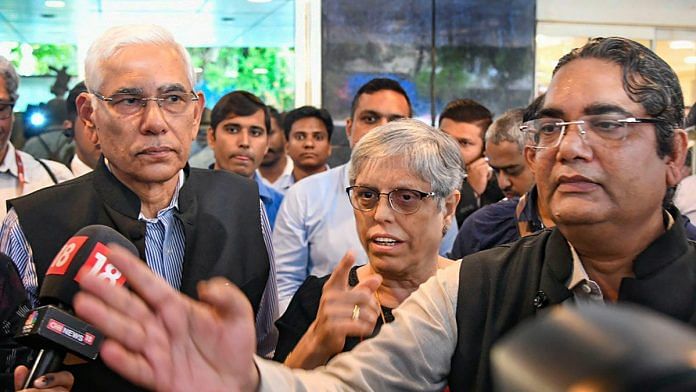New Delhi: As the Supreme Court discharged the Committee of Administrators from the obligation of running the BCCI Tuesday, it also granted its members immunity from legal proceedings for any acts performed during their tenure.
The apex court had appointed the CoA in January 2017 when it dismissed the BCCI administration for failing to implement the Justice R.M. Lodha Committee recommendations for reform. The CoA originally included former Comptroller and Auditor General Vinod Rai as chairman, and former India women’s captain Diana Edulji, historian Ramachandra Guha and banker Vikram Limaye as members. Guha and Limaye later left the CoA for different reasons, and the original members were joined by Lt Gen. Ravi Thodge (retd).
While discharging the CoA, the bench of Justices S.A. Bobde and L. Nageswara Rao said, “They shall be immune from action in respect of any acts performed by them as a Committee of Administrators in good faith. No proceedings shall be initiated against any members of the said committee individually or the committee jointly without leave of this court.”
The bench also granted similar immunity to officers who carried out directions of the CoA.
Also read: Supreme Court’s reform of the BCCI has cost Rs 16 crore since 2015
Immunity for ‘judicial discipline’
According to senior advocate Gopal Sankaranarayanan, the order was issued on an application made by the CoA.
“This was essentially to ensure that they and the others who had acted on the basis of their instructions would not be proceeded against, because eventually, the CoA is an extension of the Supreme Court, as it was appointed by the Supreme Court,” Sankaranarayanan said.
“If anybody does go after the CoA, it would indirectly mean that the court-sanctioned authority is being questioned by a subordinate court. So, in order to ensure both judicial discipline and that judicial orders are carried out, the court affords this kind of protection. There is nothing illegal about it at all.”
Also read: ‘Will lead BCCI the way I led Team India’: Sourav Ganguly promises corruption-free tenure
The Amrapali parallel
This isn’t the first time that the Supreme Court has granted immunity to one of its appointed functionaries. As recently as on 14 October, the court passed a similar order in the Amrapali Group case, where it has appointed a receiver, senior advocate R. Venkatramani, to oversee the handover of the completed projects to the buyers within the stipulated time.
During the hearing last week, Venkataramani informed the apex court that a lower court judge in UP had issued summons to him in a case regarding Amrapali properties.
A bench comprising Justices Arun Mishra and U.U. Lalit, however, made it clear that Venkataramani should not be called for any such proceedings without the court’s permission.
“We direct that the court receiver not to be called in these proceedings and any other proceedings in any court without permission from this court,” the bench ordered.
Advocate-on-record Kumar Mihir, who is representing the homebuyers in the Amrapali case before the Supreme Court, echoed Sankaranarayanan’s views.
“All the liabilities and responsibilities of the erstwhile entities (that is BCCI and Amrapali Group) would now vest in these court-appointed officers. But if they are held liable for the erstwhile entities, no one would like to take up the job,” he said.
“Imagine a magistrate looking into the working of the CoA, over something that they would have informed the Supreme Court and the court would’ve impliedly given its approval for.”
Mihir also asserted that this does not reduce the accountability on the part of the officers appointed by the court.
“Not giving protection to the court’s officer would in turn hamper the directions of the court to bring reform in the BCCI… Anyway, they are only accountable to the court… [It is fine] as long as it is a court-monitored Committee of Administrators which was giving a regular progress report,” he said.
Mihir pointed out that this was similar to the protection offered to police officers, judicial magistrates and other public servants for the things they do in “good faith”.
Also read: How Sourav Ganguly became BCCI president, with some help from BJP



